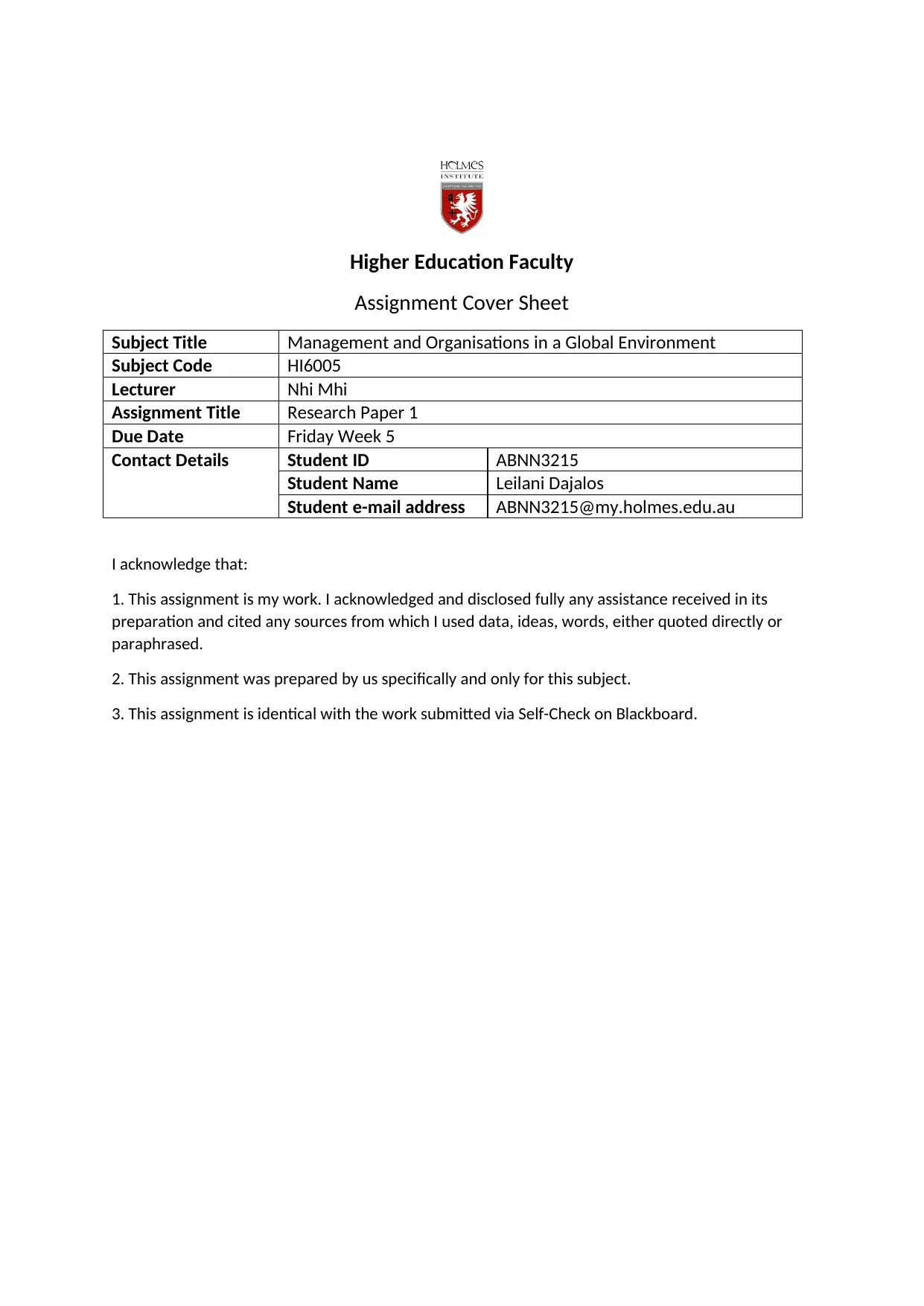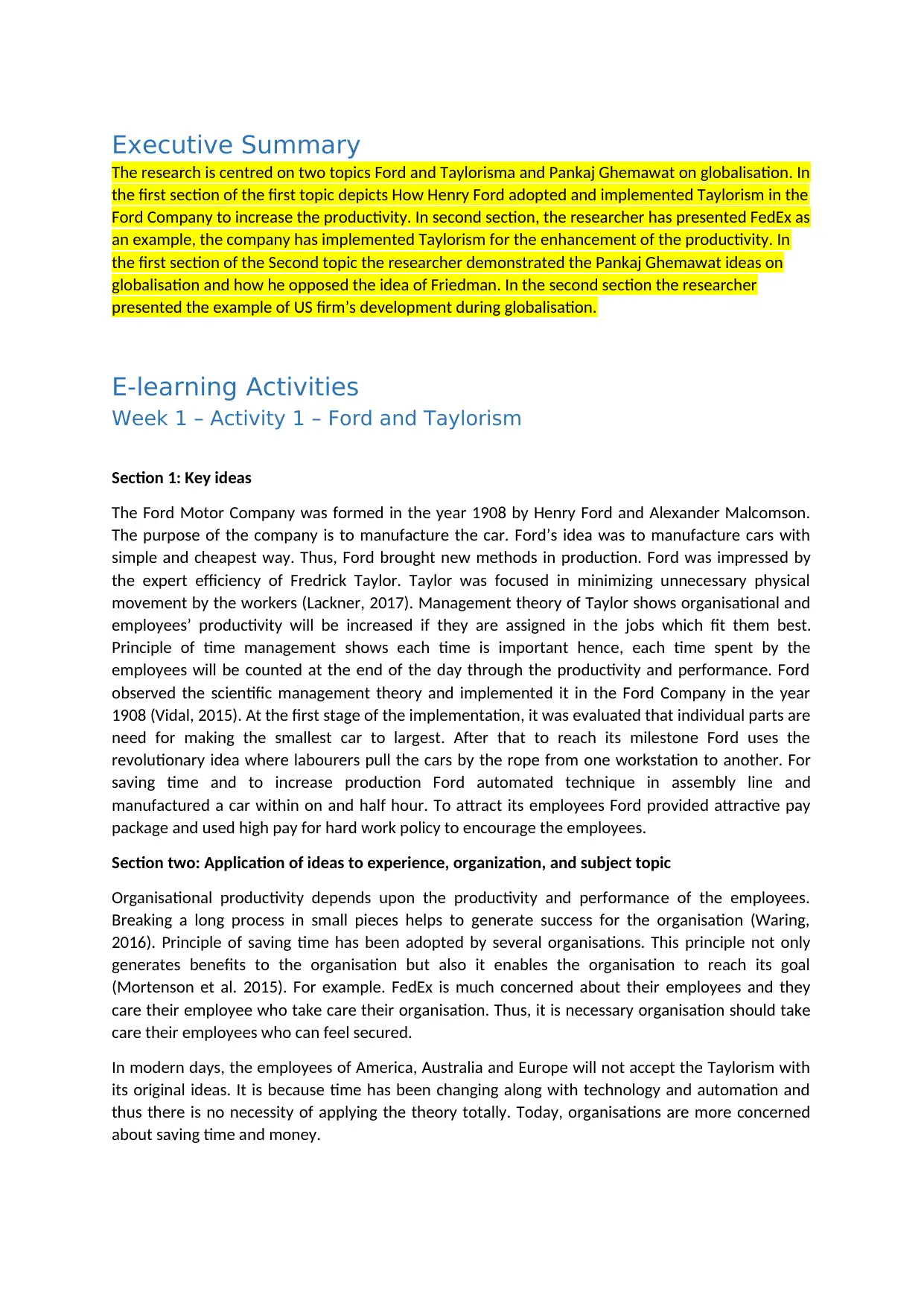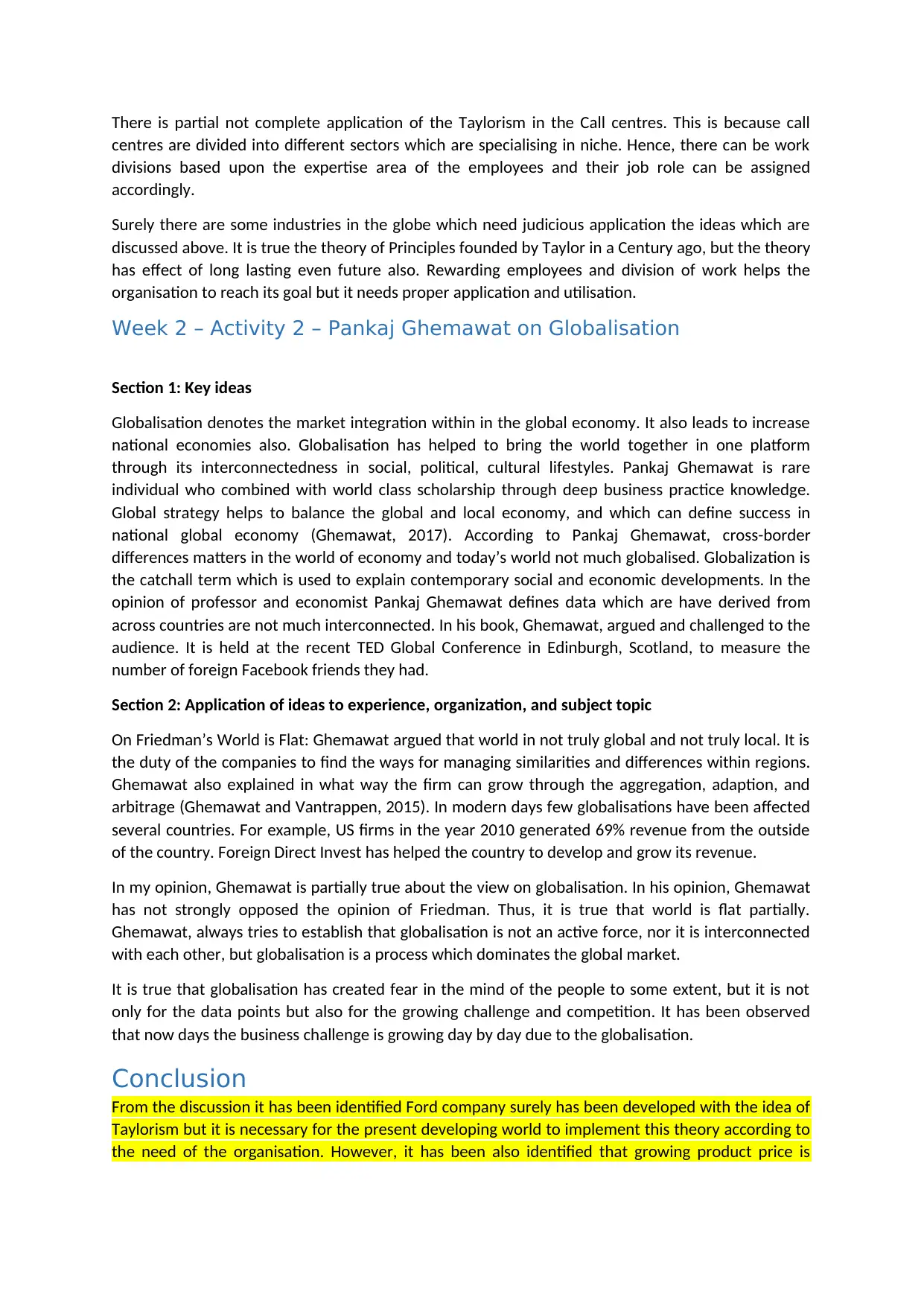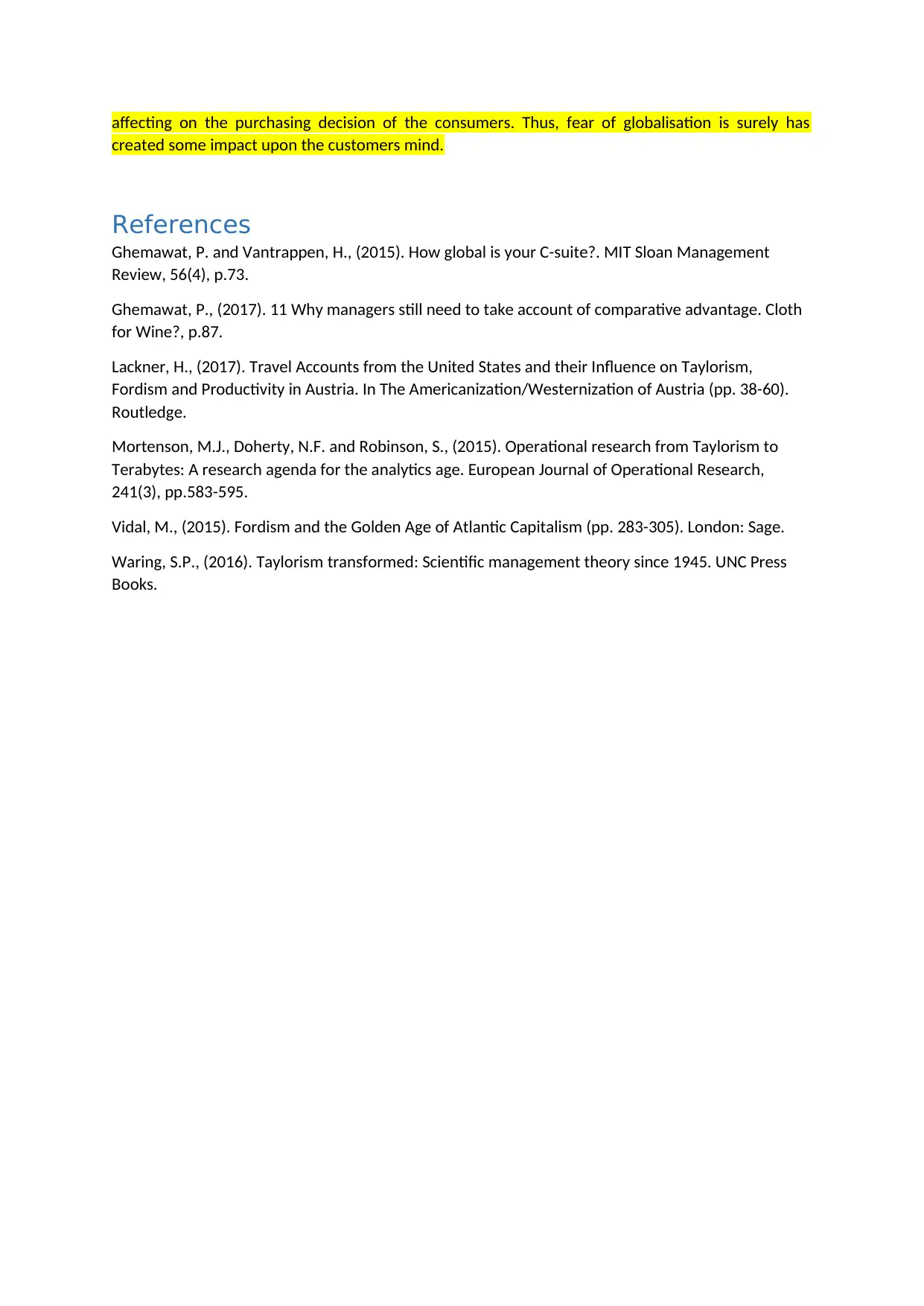Holmes Institute HI6005: Management and Organisations Research Paper 1
VerifiedAdded on 2023/06/10
|5
|1559
|175
Report
AI Summary
This research paper, prepared for the HI6005 Management and Organisations in a Global Environment course, explores the historical application of Taylorism by Henry Ford to enhance productivity within the Ford Motor Company and by FedEx. The paper then transitions to examine Pankaj Ghemawat's perspectives on globalization, contrasting his views with those of Friedman, and uses the development of US firms during globalisation as a case study. The report analyses key ideas, applications of these concepts, and provides a conclusion on the relevance of these concepts in today's business environment. It considers the impact of globalisation and the continued relevance of these ideas in modern management practices.

Higher Education Faculty
Assignment Cover Sheet
Subject Title Management and Organisations in a Global Environment
Subject Code HI6005
Lecturer Nhi Mhi
Assignment Title Research Paper 1
Due Date Friday Week 5
Contact Details Student ID ABNN3215
Student Name Leilani Dajalos
Student e-mail address ABNN3215@my.holmes.edu.au
I acknowledge that:
1. This assignment is my work. I acknowledged and disclosed fully any assistance received in its
preparation and cited any sources from which I used data, ideas, words, either quoted directly or
paraphrased.
2. This assignment was prepared by us specifically and only for this subject.
3. This assignment is identical with the work submitted via Self-Check on Blackboard.
Assignment Cover Sheet
Subject Title Management and Organisations in a Global Environment
Subject Code HI6005
Lecturer Nhi Mhi
Assignment Title Research Paper 1
Due Date Friday Week 5
Contact Details Student ID ABNN3215
Student Name Leilani Dajalos
Student e-mail address ABNN3215@my.holmes.edu.au
I acknowledge that:
1. This assignment is my work. I acknowledged and disclosed fully any assistance received in its
preparation and cited any sources from which I used data, ideas, words, either quoted directly or
paraphrased.
2. This assignment was prepared by us specifically and only for this subject.
3. This assignment is identical with the work submitted via Self-Check on Blackboard.
Paraphrase This Document
Need a fresh take? Get an instant paraphrase of this document with our AI Paraphraser

Table of Contents
Executive Summary...............................................................................................................................3
E-learning Activities...............................................................................................................................3
Week 1 – Activity 1 – Ford and Taylorism..........................................................................................3
Week 2 – Activity 2 – Pankaj Ghemawat on Globalisation................................................................4
Conclusion.............................................................................................................................................5
References.............................................................................................................................................5
Executive Summary...............................................................................................................................3
E-learning Activities...............................................................................................................................3
Week 1 – Activity 1 – Ford and Taylorism..........................................................................................3
Week 2 – Activity 2 – Pankaj Ghemawat on Globalisation................................................................4
Conclusion.............................................................................................................................................5
References.............................................................................................................................................5

Executive Summary
The research is centred on two topics Ford and Taylorisma and Pankaj Ghemawat on globalisation. In
the first section of the first topic depicts How Henry Ford adopted and implemented Taylorism in the
Ford Company to increase the productivity. In second section, the researcher has presented FedEx as
an example, the company has implemented Taylorism for the enhancement of the productivity. In
the first section of the Second topic the researcher demonstrated the Pankaj Ghemawat ideas on
globalisation and how he opposed the idea of Friedman. In the second section the researcher
presented the example of US firm’s development during globalisation.
E-learning Activities
Week 1 – Activity 1 – Ford and Taylorism
Section 1: Key ideas
The Ford Motor Company was formed in the year 1908 by Henry Ford and Alexander Malcomson.
The purpose of the company is to manufacture the car. Ford’s idea was to manufacture cars with
simple and cheapest way. Thus, Ford brought new methods in production. Ford was impressed by
the expert efficiency of Fredrick Taylor. Taylor was focused in minimizing unnecessary physical
movement by the workers (Lackner, 2017). Management theory of Taylor shows organisational and
employees’ productivity will be increased if they are assigned in the jobs which fit them best.
Principle of time management shows each time is important hence, each time spent by the
employees will be counted at the end of the day through the productivity and performance. Ford
observed the scientific management theory and implemented it in the Ford Company in the year
1908 (Vidal, 2015). At the first stage of the implementation, it was evaluated that individual parts are
need for making the smallest car to largest. After that to reach its milestone Ford uses the
revolutionary idea where labourers pull the cars by the rope from one workstation to another. For
saving time and to increase production Ford automated technique in assembly line and
manufactured a car within on and half hour. To attract its employees Ford provided attractive pay
package and used high pay for hard work policy to encourage the employees.
Section two: Application of ideas to experience, organization, and subject topic
Organisational productivity depends upon the productivity and performance of the employees.
Breaking a long process in small pieces helps to generate success for the organisation (Waring,
2016). Principle of saving time has been adopted by several organisations. This principle not only
generates benefits to the organisation but also it enables the organisation to reach its goal
(Mortenson et al. 2015). For example. FedEx is much concerned about their employees and they
care their employee who take care their organisation. Thus, it is necessary organisation should take
care their employees who can feel secured.
In modern days, the employees of America, Australia and Europe will not accept the Taylorism with
its original ideas. It is because time has been changing along with technology and automation and
thus there is no necessity of applying the theory totally. Today, organisations are more concerned
about saving time and money.
The research is centred on two topics Ford and Taylorisma and Pankaj Ghemawat on globalisation. In
the first section of the first topic depicts How Henry Ford adopted and implemented Taylorism in the
Ford Company to increase the productivity. In second section, the researcher has presented FedEx as
an example, the company has implemented Taylorism for the enhancement of the productivity. In
the first section of the Second topic the researcher demonstrated the Pankaj Ghemawat ideas on
globalisation and how he opposed the idea of Friedman. In the second section the researcher
presented the example of US firm’s development during globalisation.
E-learning Activities
Week 1 – Activity 1 – Ford and Taylorism
Section 1: Key ideas
The Ford Motor Company was formed in the year 1908 by Henry Ford and Alexander Malcomson.
The purpose of the company is to manufacture the car. Ford’s idea was to manufacture cars with
simple and cheapest way. Thus, Ford brought new methods in production. Ford was impressed by
the expert efficiency of Fredrick Taylor. Taylor was focused in minimizing unnecessary physical
movement by the workers (Lackner, 2017). Management theory of Taylor shows organisational and
employees’ productivity will be increased if they are assigned in the jobs which fit them best.
Principle of time management shows each time is important hence, each time spent by the
employees will be counted at the end of the day through the productivity and performance. Ford
observed the scientific management theory and implemented it in the Ford Company in the year
1908 (Vidal, 2015). At the first stage of the implementation, it was evaluated that individual parts are
need for making the smallest car to largest. After that to reach its milestone Ford uses the
revolutionary idea where labourers pull the cars by the rope from one workstation to another. For
saving time and to increase production Ford automated technique in assembly line and
manufactured a car within on and half hour. To attract its employees Ford provided attractive pay
package and used high pay for hard work policy to encourage the employees.
Section two: Application of ideas to experience, organization, and subject topic
Organisational productivity depends upon the productivity and performance of the employees.
Breaking a long process in small pieces helps to generate success for the organisation (Waring,
2016). Principle of saving time has been adopted by several organisations. This principle not only
generates benefits to the organisation but also it enables the organisation to reach its goal
(Mortenson et al. 2015). For example. FedEx is much concerned about their employees and they
care their employee who take care their organisation. Thus, it is necessary organisation should take
care their employees who can feel secured.
In modern days, the employees of America, Australia and Europe will not accept the Taylorism with
its original ideas. It is because time has been changing along with technology and automation and
thus there is no necessity of applying the theory totally. Today, organisations are more concerned
about saving time and money.
⊘ This is a preview!⊘
Do you want full access?
Subscribe today to unlock all pages.

Trusted by 1+ million students worldwide

There is partial not complete application of the Taylorism in the Call centres. This is because call
centres are divided into different sectors which are specialising in niche. Hence, there can be work
divisions based upon the expertise area of the employees and their job role can be assigned
accordingly.
Surely there are some industries in the globe which need judicious application the ideas which are
discussed above. It is true the theory of Principles founded by Taylor in a Century ago, but the theory
has effect of long lasting even future also. Rewarding employees and division of work helps the
organisation to reach its goal but it needs proper application and utilisation.
Week 2 – Activity 2 – Pankaj Ghemawat on Globalisation
Section 1: Key ideas
Globalisation denotes the market integration within in the global economy. It also leads to increase
national economies also. Globalisation has helped to bring the world together in one platform
through its interconnectedness in social, political, cultural lifestyles. Pankaj Ghemawat is rare
individual who combined with world class scholarship through deep business practice knowledge.
Global strategy helps to balance the global and local economy, and which can define success in
national global economy (Ghemawat, 2017). According to Pankaj Ghemawat, cross-border
differences matters in the world of economy and today’s world not much globalised. Globalization is
the catchall term which is used to explain contemporary social and economic developments. In the
opinion of professor and economist Pankaj Ghemawat defines data which are have derived from
across countries are not much interconnected. In his book, Ghemawat, argued and challenged to the
audience. It is held at the recent TED Global Conference in Edinburgh, Scotland, to measure the
number of foreign Facebook friends they had.
Section 2: Application of ideas to experience, organization, and subject topic
On Friedman’s World is Flat: Ghemawat argued that world in not truly global and not truly local. It is
the duty of the companies to find the ways for managing similarities and differences within regions.
Ghemawat also explained in what way the firm can grow through the aggregation, adaption, and
arbitrage (Ghemawat and Vantrappen, 2015). In modern days few globalisations have been affected
several countries. For example, US firms in the year 2010 generated 69% revenue from the outside
of the country. Foreign Direct Invest has helped the country to develop and grow its revenue.
In my opinion, Ghemawat is partially true about the view on globalisation. In his opinion, Ghemawat
has not strongly opposed the opinion of Friedman. Thus, it is true that world is flat partially.
Ghemawat, always tries to establish that globalisation is not an active force, nor it is interconnected
with each other, but globalisation is a process which dominates the global market.
It is true that globalisation has created fear in the mind of the people to some extent, but it is not
only for the data points but also for the growing challenge and competition. It has been observed
that now days the business challenge is growing day by day due to the globalisation.
Conclusion
From the discussion it has been identified Ford company surely has been developed with the idea of
Taylorism but it is necessary for the present developing world to implement this theory according to
the need of the organisation. However, it has been also identified that growing product price is
centres are divided into different sectors which are specialising in niche. Hence, there can be work
divisions based upon the expertise area of the employees and their job role can be assigned
accordingly.
Surely there are some industries in the globe which need judicious application the ideas which are
discussed above. It is true the theory of Principles founded by Taylor in a Century ago, but the theory
has effect of long lasting even future also. Rewarding employees and division of work helps the
organisation to reach its goal but it needs proper application and utilisation.
Week 2 – Activity 2 – Pankaj Ghemawat on Globalisation
Section 1: Key ideas
Globalisation denotes the market integration within in the global economy. It also leads to increase
national economies also. Globalisation has helped to bring the world together in one platform
through its interconnectedness in social, political, cultural lifestyles. Pankaj Ghemawat is rare
individual who combined with world class scholarship through deep business practice knowledge.
Global strategy helps to balance the global and local economy, and which can define success in
national global economy (Ghemawat, 2017). According to Pankaj Ghemawat, cross-border
differences matters in the world of economy and today’s world not much globalised. Globalization is
the catchall term which is used to explain contemporary social and economic developments. In the
opinion of professor and economist Pankaj Ghemawat defines data which are have derived from
across countries are not much interconnected. In his book, Ghemawat, argued and challenged to the
audience. It is held at the recent TED Global Conference in Edinburgh, Scotland, to measure the
number of foreign Facebook friends they had.
Section 2: Application of ideas to experience, organization, and subject topic
On Friedman’s World is Flat: Ghemawat argued that world in not truly global and not truly local. It is
the duty of the companies to find the ways for managing similarities and differences within regions.
Ghemawat also explained in what way the firm can grow through the aggregation, adaption, and
arbitrage (Ghemawat and Vantrappen, 2015). In modern days few globalisations have been affected
several countries. For example, US firms in the year 2010 generated 69% revenue from the outside
of the country. Foreign Direct Invest has helped the country to develop and grow its revenue.
In my opinion, Ghemawat is partially true about the view on globalisation. In his opinion, Ghemawat
has not strongly opposed the opinion of Friedman. Thus, it is true that world is flat partially.
Ghemawat, always tries to establish that globalisation is not an active force, nor it is interconnected
with each other, but globalisation is a process which dominates the global market.
It is true that globalisation has created fear in the mind of the people to some extent, but it is not
only for the data points but also for the growing challenge and competition. It has been observed
that now days the business challenge is growing day by day due to the globalisation.
Conclusion
From the discussion it has been identified Ford company surely has been developed with the idea of
Taylorism but it is necessary for the present developing world to implement this theory according to
the need of the organisation. However, it has been also identified that growing product price is
Paraphrase This Document
Need a fresh take? Get an instant paraphrase of this document with our AI Paraphraser

affecting on the purchasing decision of the consumers. Thus, fear of globalisation is surely has
created some impact upon the customers mind.
References
Ghemawat, P. and Vantrappen, H., (2015). How global is your C-suite?. MIT Sloan Management
Review, 56(4), p.73.
Ghemawat, P., (2017). 11 Why managers still need to take account of comparative advantage. Cloth
for Wine?, p.87.
Lackner, H., (2017). Travel Accounts from the United States and their Influence on Taylorism,
Fordism and Productivity in Austria. In The Americanization/Westernization of Austria (pp. 38-60).
Routledge.
Mortenson, M.J., Doherty, N.F. and Robinson, S., (2015). Operational research from Taylorism to
Terabytes: A research agenda for the analytics age. European Journal of Operational Research,
241(3), pp.583-595.
Vidal, M., (2015). Fordism and the Golden Age of Atlantic Capitalism (pp. 283-305). London: Sage.
Waring, S.P., (2016). Taylorism transformed: Scientific management theory since 1945. UNC Press
Books.
created some impact upon the customers mind.
References
Ghemawat, P. and Vantrappen, H., (2015). How global is your C-suite?. MIT Sloan Management
Review, 56(4), p.73.
Ghemawat, P., (2017). 11 Why managers still need to take account of comparative advantage. Cloth
for Wine?, p.87.
Lackner, H., (2017). Travel Accounts from the United States and their Influence on Taylorism,
Fordism and Productivity in Austria. In The Americanization/Westernization of Austria (pp. 38-60).
Routledge.
Mortenson, M.J., Doherty, N.F. and Robinson, S., (2015). Operational research from Taylorism to
Terabytes: A research agenda for the analytics age. European Journal of Operational Research,
241(3), pp.583-595.
Vidal, M., (2015). Fordism and the Golden Age of Atlantic Capitalism (pp. 283-305). London: Sage.
Waring, S.P., (2016). Taylorism transformed: Scientific management theory since 1945. UNC Press
Books.
1 out of 5
Related Documents
Your All-in-One AI-Powered Toolkit for Academic Success.
+13062052269
info@desklib.com
Available 24*7 on WhatsApp / Email
![[object Object]](/_next/static/media/star-bottom.7253800d.svg)
Unlock your academic potential
Copyright © 2020–2026 A2Z Services. All Rights Reserved. Developed and managed by ZUCOL.





